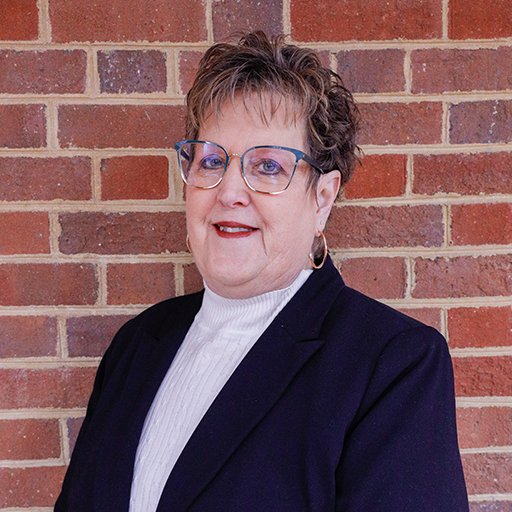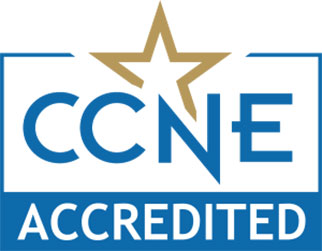Provide Family-Focused Healthcare to Patients Across the Lifespan
Prepare for advanced practice roles specializing in primary care with the online MSN Family Nurse Practitioner program at King University. This career-focused concentration is grounded in evidence-based practice, outcomes management, clinical research, and advanced clinical decision making to prepare you for leadership within the discipline of nursing. Certification exam preparation is built into the program plan to ensure your success and graduates are qualified to sit for the national FNP certification exam. After passing the certification exam, graduate may apply for advanced practice nurse licensure in their legal state of practice.
Program Benefits
- Graduate ready to sit for the national FNP certification through the ANCC or AANP
- Accredited by the Commission on Collegiate Nursing Education
- Up to 6 transfer credits accepted
- Dedicated clinical placement coordinator
- Learn from a faculty of nursing experts
The MSN Family Nurse Practitioner is Designed for…
- Working RNs who have already earned their BSN degree who are seeking to advance their careers
- Graduates of King University’s RN to BSN program
- Nontraditional learners who want an accessible educational format
Complete an online application.
The application process for the online MSN program is through an online application system provided by a Centralized Application Service made available by our accrediting agency.
Online MSN Family Nurse Practitioner Curriculum
The online MSN FNP program features a combination of nursing theory, clinical opportunities, and the latest field research to prepare you for the next phase of your nursing career.
Throughout your program, you will complete 600 practicum hours to gain experience in primary care settings including pediatrics, women’s health, geriatric care, and adult populations. These clinical experiences are delivered under the guidance of a faculty member and a practice-based preceptor. To enhance the online learning experience students are required to attend one to two day on-campus intensive sessions at the beginning of each semester. A portion of the intensive sessions is used to complement the online learning experience through application of knowledge and skills through clinical simulation and hands-on skills learning activities.
Our FNP curriculum aligns with both national and state standards to ensure you are ready for the demands of advanced practice. Program courses use a cohort model to encourage collaboration with your peers and our dedicated faculty, and our dedicated clinical placement coordinator will assist you with clinical placement.
This course prepares nurses with advanced knowledge and understanding of the pathologic mechanisms of disease to serve as a foundation for clinical assessment, clinical decision-making, pharmaco-therapeutics, and nursing interventions. Course content examines deviations from homeostasis, genetic and epigenetic influences of disease in body systems across the lifespan. A systematic survey of diseases within body systems including etiology, epidemiology, and clinical manifestations is explored. Current research findings are explored and utilized in this class.
This course focuses on the development and practice of advanced health assessment skills needed for delivery of culturally competent care across the lifespan. Diagnostic reasoning is used to interpret data obtained from the history, physical examination, and diagnostic procedures to generate a comprehensive health assessment and problem list. Domains of interest include family processes, transcultural issues, nutrition, genetic variations, growth and development, spirituality, and health promotion. Students refine the health assessment and clinical judgment skills needed to relate findings to underlying pathophysiologic changes in the client’s health status to plan therapeutic and healing interventions.
This course provides the advanced knowledge of pharmaco- kinetics, pharmacodynamics and pharmaco- therapeutics needed to initiate safe and appropriate pharmacological treatment in the management of disease processes across the life span. Special concerns regarding developmental status, nutritional status, health status, cultural influences or membership in a high-risk group are identified. Strategies for counseling and education to promote adherence are explored. Ethics, cost effectiveness, legalities and regulations related to prescription writing are addressed. Students are introduced to the use of electronic drug databases for point-of-care decision-making based on up-to-date drug information.
This course is designed to prepare the student for the delivery of culturally competent care in diverse settings to women and families across the lifespan. With an emphasis on reproductive, gynecological, and family health issues, the student will acquire the knowledge and develop critical thinking skills that allow for the application of evidence in the promotion, prevention, renewal, and maintenance of health among women and families from various social and economic backgrounds.
This is the second course in primary care of the family. This course continues the development of skills in decision-making and the use of an evidence-based approach in the clinical management of families. In addition, the course includes study and clinical application of major theories of health promotion, risk assessment, differential diagnosis, health behavior change, and disease prevention across the lifespan. Cultural and socioeconomic factors are explored. Scope of practice issues continue to be addressed.
This course focuses on the management of common pediatric health and illness concerns using an evidence-based approach to assessment, differential diagnosis, and management. Includes the study of clinical application of major theories of health promotion and assessment, family dynamics, health behavior change, and disease prevention for the well child and adolescent. Students will develop skills in the collaborative management of the ill pediatric and adolescent patient. Scope of practice issues are addressed.
This course builds on the previous FNP course sequence and requires synthesis of advanced practice knowledge base and family nurse practitioner clinical skills for effective management of complex clinical problems across the lifespan. The emphasis is on acute and chronic illness as it affects all age groups. This course requires increasingly independent clinical application of evidence-based approaches to the assessment, health promotion, differential diagnosis, and management of families in their cultural and socioeconomic context. Scope of practice issues continue to be addressed.
This course examines issues related to assuming the advanced practice role including the legal and ethical aspects of practice, quality assurance issues, patient advocacy, leadership, interdisciplinary collaboration, and the stewardship of resources. Emphasis is placed on demonstrating a clear understanding of the professional nurse practitioner role and the transition to the professional clinicians’ role, including certification and licensure requirements. Current practice issues affecting nurse practitioners are examined.
Admission Requirements
Students applying for the online MSN program must meet the following requirements:
- A bachelor’s degree in nursing from a regionally accredited program.
- A minimum 3.0 GPA on a 4.0 scale on all prior academic work.
- Students with a lower GPA may be considered and accepted on a conditional basis.
- Undergraduate coursework completed with a C grade or better in the following disciplines:
- Statistics
- Nursing research/evidence-based practice
- Health assessment
- Pathophysiology (highly recommended for Nurse Education students, but not required)
- Current unrestricted licensure to practice as a registered nurse in Tennessee (compact/multi-state accepted). The applicant may not be on probation and must report any past or current disciplinary action taken by a State Board directly to the Dean of the School of Nursing.
- Laptop computer with Microsoft Office 365, wireless and webcam capability is required. Microsoft Office 365 is available to all King students to load on the PC or Mac and is accessible at Office.com using their King University credentials. Chromebooks and many tablets will NOT meet the minimum requirements for the SON Programs.
Students applying for an online MSN program must submit the following materials:
- A completed application through NursingCAS.
- Official transcripts from all institutions attended**
- Verification of current unencumbered registered nurse license from the Tennessee Board of Nursing or compact multi-state licensure with privileges to practice in Tennessee.
- Copies of all certificates in an area of clinical concentration, if applicable.
- A current curriculum vitae including professional organization memberships and activities and community service.
Post-Acceptance Requirements
Within the first semester of your program students will also be required to provide the following documents:
- Two letters of recommendation, preferably one from an employer and one from a previous college professor. When applying online, students may submit the names and email addresses of individuals offering a recommendation to automate the process. (Note: Applicants for guaranteed admission to the MSN program must submit the names and emails of three recommenders. See below for details.)
- A two- to three-page typed writing sample to address the following question: What is the role of graduate education in preparing nurses to meet the health needs of our society? Writing sample must cite two peer-reviewed journals and be written using APA style.
- A personal essay. Details will be provided by your enrollment counselor.
**Courses are applicable for transfer if they are applicable to the requirements of the program, and are approved by the specialty area faculty and the Dean of the School of Nursing. Courses being transferred must have been assigned a grade of B or higher and must have covered content which is required for a particular core course or specialty program.
Students completing the BSN degree from King University may apply for guaranteed admission to an MSN program during the final semester of the BSN program. Students applying for guaranteed admission must meet the following admission criteria in addition to those listed above:
- Have a cumulative undergraduate GPA of 3.5 or higher
- Submit three letters of recommendation (two academic and one professional)
- Have received no academic sanctions during BSN program
Guaranteed admission is contingent on the time of application and seats available per semester.
Career Outlook for Family Nurse Practitioners
Family nurse practitioners are in extremely high demand across the country because of the essential role they play in the team-based model of healthcare delivery and a growing emphasis on preventive care. The online MSN FNP program prepares you to step into the family nurse practitioner role as a certified expert ready to practice in primary care settings.
- Family Nurse Practitioner, $105,887 per year1
- Employment Growth, 46% 2023-20332
MSN FNP Faculty

Assistant Professor of Nursing
“I am blessed to have the opportunity to teach at a King University. The Christian atmosphere at King embraces and supports students as they achieve academic excellence.”

Dean of the School of Nursing
“Nursing is more than a career it is a calling. I am blessed to have been called to serve in this honorable profession. A career in nursing provides many options, and opportunities. It is never boring, and there is always a challenge. Nursing is more than a career or a job, it is an opportunity to change lives and make a difference in the world.”

The School of Nursing programs are fully approved by the TENNESSEE BOARD OF NURSING, and are a member of the AMERICAN ASSOCIATION OF COLLEGES OF NURSING.
The baccalaureate degree program in nursing and master’s degree program in nursing at King University are accredited by the Commission on Collegiate Nursing Education.
Customize Your Area of Study
King’s online MSN program offers a range of concentrations to align your studies with your professional goals. Explore your options below.
Sources
- Payscale. “Average Family Nurse Practitioner Salary.” Retrieved Feb. 2025, from https://www.payscale.com/research/US/Job=Family_Nurse_Practitioner_(NP)/Salary.
- U.S. Bureau of Labor Statistics. ” Nurse Anesthetists, Nurse Midwives, and Nurse Practitioners.” Retrieved Feb. 2025, from https://www.bls.gov/ooh/healthcare/nurse-anesthetists-nurse-midwives-and-nurse-practitioners.htm.
